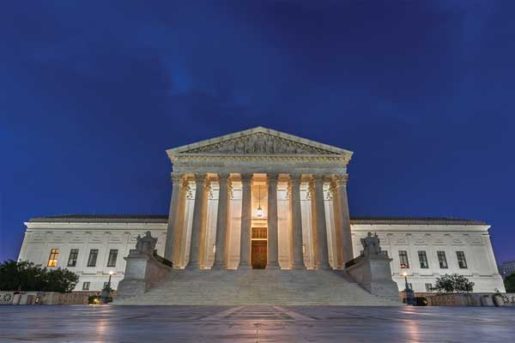By Shaghayegh Hanson
Politics and the Supreme Court
The Deliberate Erosion of Impartial Justice

The year I came to the U.S. from England happened to be the year when Clarence Thomas’ confirmation hearings were unfolding on television day after day. I had recently obtained my British law degree and was attending law school here in the U.S. I had never seen such unbridled political interference in a judicial selection process; it shocked me. I took my questions and comments regarding the process into my constitutional law class where the subject ignited some heated debate among the students, much to the delight of our professor.
It surprised me to learn that Article II of the U.S. Constitution gives the president the power to nominate a Supreme Court justice and, also, appoint that person “by and with the advice and consent of the Senate.” I just could not understand why the Founding Fathers thought this was a good idea. I mean, wasn’t that guaranteeing that the selection and confirmation of a nominee would become mired in political manipulations and tawdry mudslinging? How was this type of system supportive of the separation of powers and an impartial judiciary?
In the British system, for example, judicial selections were made based only on merit with input from senior judges about a candidate’s abilities.1 Today, the British system has progressed even further; appointments are made by an independent commission after open competition.2 The commission is chaired by a layperson and consists of judges, lawyers, and other lay members. A major goal of this system is to keep politics out of the selection process because, “In a country operating under the rule of law, judges need to be independent of the executive. It must not be possible for the executive to require or improperly influence judges to decide cases in a particular way. Otherwise, there is an inevitable danger that the law could be used (or would be perceived as being used) to service the interests of the executive.”3
All these years later, and here I am again, finding the whole U.S. process even more noxious. At the time of this writing, the confirmation hearings for Amy Coney Barrett have wrapped up and there is little doubt that she will be confirmed in due course, along party lines. The last few years have been the most politically divisive I have experienced since moving to this country in 1991. Not surprisingly, tied as it is to the politics of its time, the usual controversies in appointing a justice to the U.S. Supreme Court has been proportionately affected. The nomination and appointment process has become so politically charged, with so much at stake for citizens (e.g., healthcare, pandemic response, right to abortion, same-sex marriage, criminal justice reform) that observers from other countries are shaking their heads in pity. Justice Jonathan Sumption of Britain’s Supreme Court recently stated in The Times, “What works for them [U.S.] does not necessarily work for us. But it is not clear at the moment whether it even works for them.”4
The influence of politics on the U.S. judicial branch is a complicated issue that is not easily resolved by adopting, say, the British process of selecting judges (described as “almost [] like an internal promotion system rather than a politicized process”).5 Unlike the U.K. Supreme Court, the U.S. Supreme Court has the power to strike down legislation as unconstitutional. Thus, the argument in favor of the U.S. selection process is that since the U.S. Supreme Court is tasked with reviewing political matters, the need for popular political legitimacy of a nominee is greater.6 However, if that is indeed the sustaining rationale, the system is failing, and the consequences are grave.
For example, sixty-six percent of Americans do not want to see Roe v. Wade (securing abortion rights) overturned,7 sixty-seven percent of Americans favor same-sex marriage,8 and over half of the population is against overturning the Affordable Care Act (known as the ACA, which enabled more than 20 million Americans to gain healthcare).9 And yet, the official 2016 and 2020 Republican agenda lists reversing Roe v. Wade so as to criminalize abortion, reversing Obergefell v. Hodges so as to eliminate gay marriage, and reversing the ACA as priorities. Donald Trump has made no secret of the fact that Barrett’s selection was made to achieve these goals. Barrett’s nomination in the first place, made within weeks of a presidential election, is unabashedly an act of political strategy to pre-empt the will of the people should they choose Biden over Trump.
The biggest and most troubling result of the role of politics in the selection of justices to the highest court of this country is the proven effect of “dark money” on who “qualifies” as a nominee—money designed “to cement pro-corporate and partisan donors’ interests in law by controlling our courts.”10 The U.K. has its fair share of scandals about politicians being “bought off’ by special interest groups, but the nonpolitical selection system for the U.K. judiciary protects the judicial branch from the nefarious influence of private donors. Not so in the U.S.
Here, a small number of anonymous billionaire donors can influence politicians and affect the make-up of the court by pouring tens of millions of dollars into nonprofit organizations to fund judicial confirmation battles. According to at least one expert, “Conservatives have mastered the dark-money game and left Democrats in the dust.”10 For example, one of the biggest players, the Judicial Crisis Network, received a single anonymous donation of $17 million to fight Merrick Garland and support Neil Gorsuch; this network has promised to spend $2.2 million on Barrett.11 The description and machinations of these groups are beyond the scope of this article but the information is well-documented and readily available from a variety of reliable sources. Suffice it to say that “the Supreme Court under Chief Justice Roberts has become a delivery system for Republican interests.”12 One need only review the seventy-plus, 5-4 partisan decisions in favor of conservative causes, including the infamous Citizens United case, to reach this conclusion.13
I have nothing against Barrett personally, she is clearly a smart lawyer and appears to be a good person. But what she may not realize when she says she has no agenda, is that she IS the agenda; that she was picked because her entire legal philosophy will serve partisan politics whether she consciously intends to do so or not.
1- https://www.judiciary.uk/about-the-judiciary/the-judiciary-the-government-and-the-constitution/jud-acc-ind/jud-appts/
2- https://www.judicialappointments.gov.uk/commissioners
3- https://www.statewatch.org/media/documents/news/2007/oct/uk-consult-judicial-appts.pdf
4- https://www.washingtonpost.com/world/2018/10/06/why-americas-supreme-court-drama-looks-so-strange-rest-world/
5- https://www.bbc.com/news/world-us-canada-45632035
6- https://www.lawscot.org.uk/members/journal/issues/vol-60-issue-02/supreme-courts-the-us-and-uk-compared/
7- https://www.nbcnews.com/politics/2020-election/poll-majority-adults-don-t-support-overturning-roe-v-wade-n1241269
8- https://news.gallup.com/poll/311672/support-sex-marriage-matches-record-high.aspx
9- https://www.cnbc.com/2019/12/29/how-the-affordable-care-act-transformed-the-us-health-care-system.html
10- https://www.nbcnews.com/think/opinion/amy-coney-barrett-rose-corporations-crusade-power-over-supreme-court-ncna1243251
11- https://slate.com/news-and-politics/2020/10/federalist-society-judicial-crisis-network-amy-coney-barrett.html
12- https://www.acslaw.org/issue_brief/briefs-landing/a-right-wing-rout-what-the-roberts-five-decisions-tell-us-about-the-integrity-of-todays-supreme-court/
13- https://www.acslaw.org/issue_brief/briefs-landing/a-right-wing-rout-what-the-roberts-five-decisions-tell-us-about-the-integrity-of-todays-supreme-court/ –Appendix of cases.

















